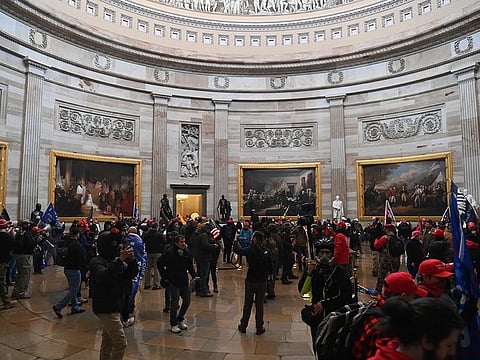Storming Capitol puts America’s credibility at stake
It is harder for the US to act as the beacon of democracy that it has been for decades

America could hardly have been kinder. First, there was the mishandling of a coronavirus pandemic spiralling out of control; then, chaotic elections that the incumbent refused to concede. Now, the televised storming of Capitol Hill by marauding protesters. This is invaluable material for those eager to portray transitions of power as anarchic and damaging, cementing their own importance as custodians of stability. It helps justify their clampdowns on opposing voices and enfeebles the US in standing up as a meaningful proponent of democracy. The potential short-term damage is no doubt overdone by the effects of dramatic footage. President-elect Joe Biden will take over in two weeks and the pillars of the US political system are still standing. But the pernicious longer-term impact of events in recent months “- culminating with the first large-scale breach of the Capitol since 1814 are far more worrying, especially for people fighting for freedom and representation elsewhere.
As with a Rorschach inkblot test, everyone is reading into the mayhem what they want. Many newspapers are making a comparison demonstrators elsewhere. The leading paper carried a roundup of online Schadenfreude, contrasting images of regimented Covid-19 fight with clashes in Washington.
Polish television likened the demonstrators to the country’s own opposition. Maria Zakharova, merely shared a post from former CNN Moscow bureau chief and scholar Jill Dougherty: “The United States will never again be able to tell the world that we are a paragon of democracy.” It’s noteworthy that, for now at least, commentary is sparser than back in November. The images from the ground are enough to do the work of many thousands of words for the world’s propagandists.
Strongman leaders, meanwhile, are mirroring back language normally used by the State Department on distant electoral disarray. Turkey said it was following internal developments with “concern” and called on “all parties in the US to maintain restraint and prudence.” Diosdado Cabello, a senior figure in Venezuelan leader Nicolas Maduro’s political circle, tweeted “I’ll be brief: The USA, what a mess. We will win!” The government condemned “political polarisation” and a “spiral of violence that only reflects the profound crisis that the US political and social system is going through.”
There are three worrying consequences in all this. First, it makes peaceful transitions of power more difficult by bolstering the notion that strongmen love to support “- that alternating leaders equals pandemonium. The promotion of stability has already helped others to justify constitutional changes. Second, the example of US disarray allows authoritarian leaders in other democracies, and those teetering on the brink of becoming one, to tighten control over opposition voices. Washington, they will argue, is proof of what happens when extreme, fringe elements run wild, society is allowed to fracture and social media is unbridled.
The third, and perhaps most painful outcome, is that it becomes far harder for the US, having failed the most basic test, to act as the beacon of democracy that it has been for decades.
In extremis, this could prove to be, as so many have rushed to say, the US equivalent of the 1923 Munich Putsch. But it’s vital to point out that what happens next is not predetermined. Americans are now waking up to the cold reality of what so many of us who have seen less stable or long-lived systems already know: Democracy can erode fast, if you allow it to. In fact, what happens next matters almost more than what we’ve just witnessed. The US succeeded in counting its votes in the midst of bedlam back in November. If the country can now act to mend the torn social fabric and repair its politics, it will provide a better lesson in democracy than years of preaching ever could.
Clara Ferreira Marques a noted columnist. She was an associate editor for Reuters







